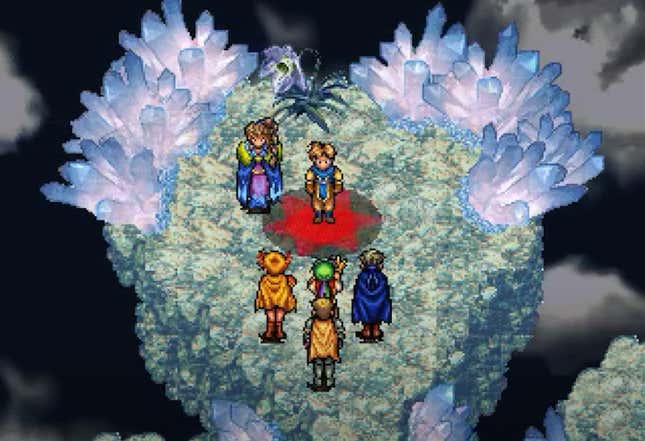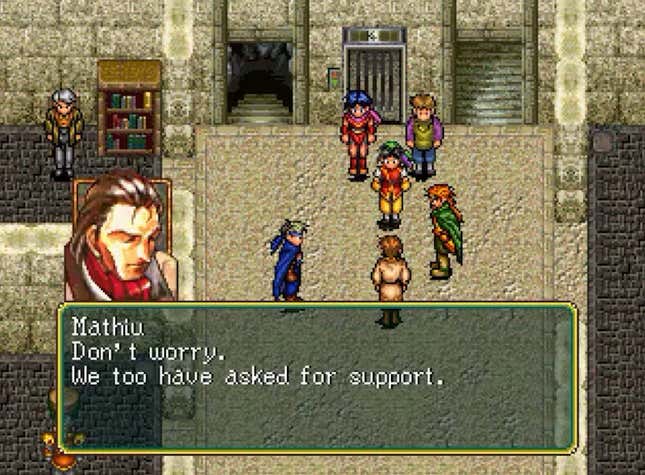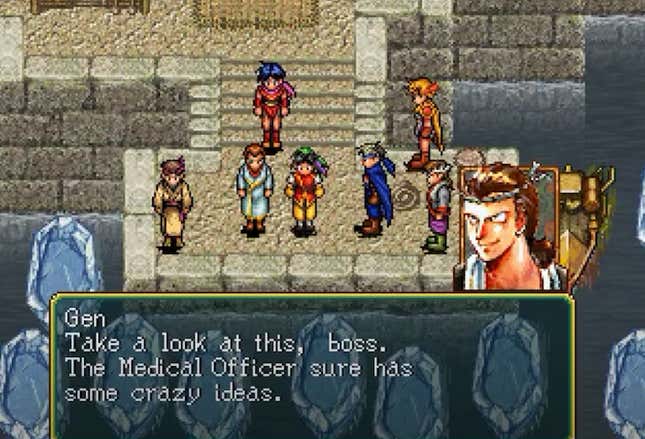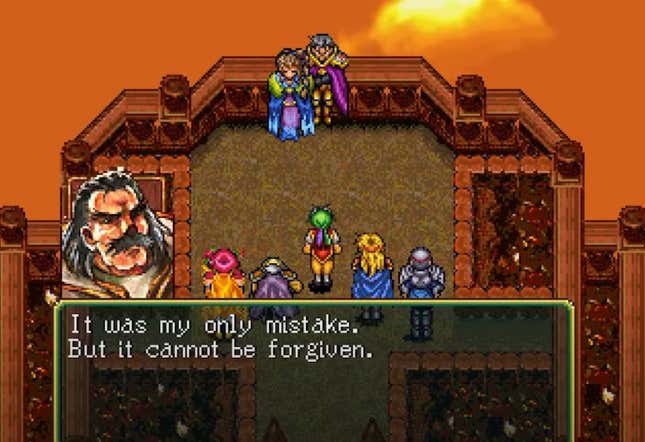
Hi Kotaku! The last time I was a weekend editor for Kotaku was way back in February and honestly, that seems like a lifetime ago. So much has happened since then that even looking back at my old articles feels like I’m peeking at a time capsule from a different age.
I’m honored, as always, to be back. A little about me? I used to work in the game industry (LucasArts, EA) and am an occasional contributor to Kotaku. I’m also the author of two books called Mecha Samurai Empire and Cyber Shogun Revolution, both of which are about big mechas fighting Nazi monsters. My lineup this weekend encapsulates much of my year. As I was so busy between work, taking care of my kid, getting writing done, and juggling a hundred other things, almost all the gaming I did was on portable systems; either the DS or the Switch. I did squeeze in some time with retrogames I’d long wanted to get to, like Time Hollow, Phantasy Star III (both of which I cover), Mega Man Legends, and Lunar (don’t cover those two).
Every time I guest write, I’ve started with an ode to a quirky part of gaming that has stuck with me, whether it’s oversized inventories inside pockets, or unused items that are hoarded over a hundred hours or so in a JRPG. This time, my ode is to the games that took us forever to finish. This is separate from that neverending backlog I have with games like Wild Arms, the original Nier, and Final Fantasy XIII-2.
This is about games that we complete, but take a really long time to get there. Sometimes, it’ll be a specific quest that deters my progress; I remember it took an extra long time for me to finish The Legend of Zelda: Wind Waker because I got so annoyed by the Triforce search and how many rupees I had to collect. Some games were just too hard for me as a kid which is why I didn’t beat NES classics like Blaster Master, Batman, and Teenage Mutant Ninja Turtles until I was a lot older. In the case of the first Parasite Eve, I really enjoyed the game on the PS1. But my memory card had a defect and when I loaded it up a few days into the mystery, all my save files had been deleted. I was so frustrated, I didn’t revisit the game for almost 15 years, but was glad to finally get through and face the horror a few Halloweens ago. There are instances where a game just didn’t resonate at a specific moment in my life. It took me a few attempts before I finished Lost Odyssey, but I’m glad I waited as the tale of immortality meant a lot more playing it when I did (I’ll be writing more about why in an essay this weekend).
Some games are worth the wait. Others might have been better left unfinished. Suikoden is definitely in the former category.

I learned about Suikoden almost twenty years ago. It was at an Electronics Boutique I used to go to. I don’t remember the name, or even the face, of the guy who worked there, but he recommended some of my favorite games; the very first Resident Evil, Riven, Castlevania: Symphony of the Night, and even an obscure PC adventure game called Sanitarium. Pretty much whatever he recommended, I loved.
I had just finished Final Fantasy VII and asked him if he had something similar, knowing it was a hard act to follow. He wholeheartedly recommended Suikoden. I started playing it, but I couldn’t get into it. It was for silly reasons; the medieval setting seemed a far cry from the epic cyberpunk masterpiece of FFVII that I was longing for. So in a misguided moment, I ended up returning it.
A few years later, a colleague at LucasArts asked if I’d played Suikoden II. I confessed I hadn’t because I hadn’t liked the first one. He insisted I play and he was right. I loved Suikoden II and enjoyed its followup as well, Suikoden III. So I thought I’d go back and try playing the first Suikoden again. I found it wasn’t as rich or complex as its sequels and I had so many other games I wanted to play, I ended up giving up on it again.
It was only about a year ago when I finally picked up Suikoden as I’d seen a few people mention how much they liked the game. Fortunately, this time, it clicked. I actually wrote about my experience with the first half of the game at Kotaku last year. I finally finished the second half earlier this year and it was better than I’d hoped.

Suikoden doesn’t glorify war, but paints the cost of conflict in bleakly grim hues, even if it is with an anime aesthetic. One of the most shocking moments of the second half is when Gremio, friend and guardian to Tir, pays the ultimate price to protect him. His terrifying death at the hand of man-eating spores was really disturbing. In the aftermath of his friend’s demise, Tir drops to the ground, speechless, devastated by what he’s seen. When he rises from his bed, he’s depressed by the loss of his friend. All the members of his army urge him to fight on. Initially, I felt a sense of hopelessness, but that was soon replaced by anger as I wanted revenge.
The army you assemble is a diverse one. The dragon knights are awesome, unleashing a fierce bombardment to open each battle sequence. The ninjas predict enemy movement, giving you a sense of what to expect next and giving new insight into Sun Tzu’s adage of the importance of spies. Right before the characters engage in battle, they all take a moment to speak, reminding players how they each have a personal stake in the fight. While you don’t get to know all 108 characters, Suikoden tries its best to involve as many of them as possible. It’s amazing to see your headquarters evolve from what was an abandoned and decrepit old structure to a worthy base attracting the best soldiers and tacticians throughout the continent.

Some members have to be sought out and recruiting new members often means taking along the right character. In the case of the master smith who can strengthen your weapons to their max, he must see all four of his students in Tir’s party before being convinced to join the Liberation Army. On the other hand, some recruits are downright hostile. In the battle against the floating fortress, the brilliant tactician, Mathiu, conjures up an armada using boats made out of ice. Mathiu hates war, but joins because of his sister, Odessa’s, request. He was part of the Empire, but in the tragic aftermath of the Kalekka Incident, walked away, frustrated. In the present, the army storms the fortress and defeats the imperial navy’s commander, Sonya. Ironically, Sonya hates Tir because he killed his own father, whom she loved. She does join, but only because she wants to personally see Tir fail.
It almost happens. During this crucial battle, the Liberation Army is betrayed by one of their own. Mathiu dies from the wounds he sustained in a fire caused by the traitor. But even as he’s dying, he puts the mission first, insisting the traitor not be arrested in case it lowers morale for the troops. He even invites his uncle, Leon, to join them, despite the fact that he was the architect of the incident that led to his disillusionment. The pathos of these individual stories and their interconnected threads is part of what makes Suikoden so compelling.
Once my army finally emerged victorious, the Scarlet Moon Empire’s Emperor Barbarossa accepts his fate, realizing he did everything out of his love for the sorceress, Windy. The ending is bittersweet. Tir is victorious, but lost many of the people who were dear to him. Depending on how many characters Tir recruits, Gremio can be resurrected. If not, it’s all the more depressing considering he’s lost Gremio, his friend, Ted, and his father.

In the end, Tir rejects the presidency and walks away, Gremio by his side (at least in the good ending). For those who’ve played Suikoden II with a Suikoden I save file, you know he’s exiled himself to a fishing village.
As the credits rolled and I learned what happened to all the characters, I felt this immense joy and satisfaction at finally having finished the game. I wondered to myself why I’d been so quick to dismiss it when I was younger. At the same time, I was grateful I got to experience it the way I did. I had a greater appreciation for the series, knowing what awaited in its future. I’m also glad I got to finish this year when every moment I got a chance to play was precious.
There’s still a bunch of games on my backlog that I intend on finishing. Will I enjoy them as much as Suikoden? I can’t say, but I sure hope so.
As to the guy at EB who recommended the original game, my apologies. It took me twenty years to realize it, but I was wrong.
On that note, we’re all human and make mistakes. If you notice any issues, have any questions, or just want to say hello, please leave a note in the comments or tweet me at @TieryasXu.